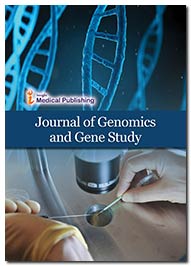Deficiency in ORC1 Affects Heterochromatin Organization, Sister Chromatid Cohesion and the Response to DNA Damage in Meier-Gorlin Syndrome
Meryem Alagoz *
*Corresponding Author:Meryem Alagoz
Biruni University, Turkey
Abstract
DNA replication origins are licensed by the pre-replication complex, which encompasses six components of the origin recognition complex (ORC), CDT1, CDC6, and the MCM helicase. Mutations in pre-replication complex components have been shown to cause Meier-Gorlin Syndrome (MGS) a disorder characterized by microcephaly, short stature, and patellar abnormalities. ORC components have also been shown to localize to heterochromatin and impact on the heterochromatin superstructure. Here, we show that deficiency in ORC1 in MGS patient cells impairs sister chromatid cohesion and formation of heterochromatin via a process we refer to as ‘decompaction’. Comparison to other human cell lines with disordered chromatin, ICF (Immunodeficiency- Centromere instability-Facial anomalies syndrome) and RETT syndrome, revealed that the effect of Orc1 deficiency on heterochromatin structure is profound in human cell lines. Depletion of ORC1 by si-RNA knockdown affects heterochromatin assembly and diminishes levels of HP1 and H3K9Me3.
Biography
Meryem Alagöz completed her BSc studies in Medical Biology at CerrahpaÅ?a Medical School and pursued her MSc studies in Molecular Biology and Genetic Engineering at the University of Sussex. She attained her PhD from the University of Sussex. Her PhD Project involved in the investigation of genetic alterations in human breast and ovarian cancer. She had worked as a Post-doctoral research fellow at Kings College and Imperial College. She worked at the University of Sussex for 7 years as a research fellow and still collaborating with them for her research. She has been investigating the molecular mechanisms involved in the development of human diseases such as cancer and brain disorders. She has been working as an assistant professor at the Molecular Biology and Genetics Department of Biruni University since February 2017. She has been setting up the research and diagnostic laboratories at the Genome Centre employing advances technologies such as Next generation sequencing. In near future, she would like to focus on DNA damage and repair field where she gained extensive experience during her studies and research. She will employ these experiences to research into the broader area of genetic disorders.
Open Access Journals
- Aquaculture & Veterinary Science
- Chemistry & Chemical Sciences
- Clinical Sciences
- Engineering
- General Science
- Genetics & Molecular Biology
- Health Care & Nursing
- Immunology & Microbiology
- Materials Science
- Mathematics & Physics
- Medical Sciences
- Neurology & Psychiatry
- Oncology & Cancer Science
- Pharmaceutical Sciences
